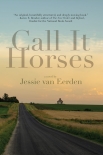Call It Horses by Jessie Eerden (good books for high schoolers txt) 📗

- Author: Jessie Eerden
Book online «Call It Horses by Jessie Eerden (good books for high schoolers txt) 📗». Author Jessie Eerden
“Dillon,” someone said and shook his hand and he smiled. Then others.
I stood near the casket, near the mute blue dead. Across the room Dillon smiled at someone else. He erupted through time, a spike punched through the gauze into the blank expanse of the days of my life as I lived it then. How many years? Twelve? Fifteen? He did not see me. My chest shrank in asthmatic constriction, my breaths shortened, and I touched all parts of the paint box which was unlidded, more like a paint tray with a handle in the center, like a shoe shine kit. I touched the jars of acrylic, ochre cobalt sienna goldenrod smoke, their names so touchable, Ruth. A slot on one side held two wood-handled horsehair brushes you had carefully used once or twice, which I had rinsed and softened. It was for Clarissa, but I set the paints at Darrell’s feet inside the coffin, in a panic, and I weaved through the crowd with what breath I still had. Through the kitchen, out the door to the side yard where no bodies congregated.
From the glove box of my truck, I grabbed the paper bag always stowed there, put it to my mouth. The truck was blocked in. I stumbled toward the field, in out, in out, the wheeze not deep yet but frantic to find its tunnel to my lungs, in out, in out. Bugs rose to small storms, disturbed from their feeding by my legs and by the gale of loose mint dress when I ran, once I could breathe. I ran through Darrell’s half-uncut alfalfa into the woods, into the swamp mallow and skunk cabbage—suffocating and too familiar, but I wanted it then—the marsh slopping black onto my shins and calves. The suck of the ground and slap of low leaves reduced me to girlhood.
Thicker into the woods the air went dense. I breathed into the bag again and closed my eyes. A thrush mourned, another answered incongruously with a trill of joy. I walked, eyes closed, letting branches snag my hair. I walked all the way to the spring source of Heather Run where the moss seeped. I calmed and believed I would walk back to Clarissa when I could, I was glad Tess was there, I would go back. She needed me. I did not go back, though. I knew where I was going. I walked to the Train Cave.
I’d always loved how you could feel more than see the cool outstretched limestone. The hush deepened into the ground, ancient and transgressive and moldy. Several yards in, I stood just shy of where the dark swallowed everything and let my eyes adjust. I heard the mutter of water. I breathed. Beer cans peeked into my settling vision, the foil of chip bags, crumpled blankets hiding condoms I didn’t need to look for. The Train Cave where high school kids still drank and fucked. As I had once. I was the twenty-something aching for a Dillon absent even as he was inside me, then I was the adolescent, and then even younger, when Dillon and Clarissa and I had played cards as kids, packing in RC Cola and flashlights. Then—there in the cave like a hologram—the boy who tied a string in my thick hair, who salved and shared the solitary in me.
From the evening light washing through the cave mouth into the small anteroom, I made out a battery Coleman lantern someone had left behind. I turned it on and held it up, the shine dim. Tusks of stalactite, stalagmite, words I loved to say, rustle of bats, pools of the eternal wet. Lichen sleeved a flat rock, and I sat. A little cache of Coors right behind it, and animal-raided snacks, shreds of dollar-store bag. My dress and underwear instantly soaked through. I was cold.
I turned to the cave wall to scan the old graffiti. But the graffiti was not old. It looked new. I stood and touched it—not even dry. Bold colors like the ochre and cobalt in the paint box, brush painted, I guessed, not the feathery traces of aerosol.
I held up the faint Coleman to strange hoofed things. A tricolored sheep with a missing face. A rowboat unmanned and pretty. A woman, also faceless, arms reaching out in mid-movement, long hair a streak. Hollyhocks. Things that had taken time. And also suggestive, lewd pictures. A cock erect and blue. Another. Vulva and spread legs, breasts cupped by six multicolored hands. More flowers that grew more small splayed bodies. I held the lantern closer to the beautiful flesh, touched it again and, yes, the paint was new. Strange fecund bodies that did not stop or separate, their rivers would not dry, each limb a folded-back petal. No high school kid had done this. There was a tenderness, there was skill, and also sadness.
Only one face was painted, all the other bodies left faceless. The face painted red on a blue body with green hair. I couldn’t say if it was sad or happy, but the eyes looked real as if seeking me out, as if living. How could I not think of your hieroglyphs, Ruth, your desert cave walls where bird and body and bread sounded out the story? I backed up to take in the whole of it, nearly a mural, the right-hand side ending in rushed sketches, the painter had had to go. It was baffling and it moved me to think of it wasted on darkness. I switched off the lantern.
“ELLIS STINKS,” SAID NAN. “He needs a bath.”
The light had shifted in the Tennessee sky, autumnal and slanting





Comments (0)